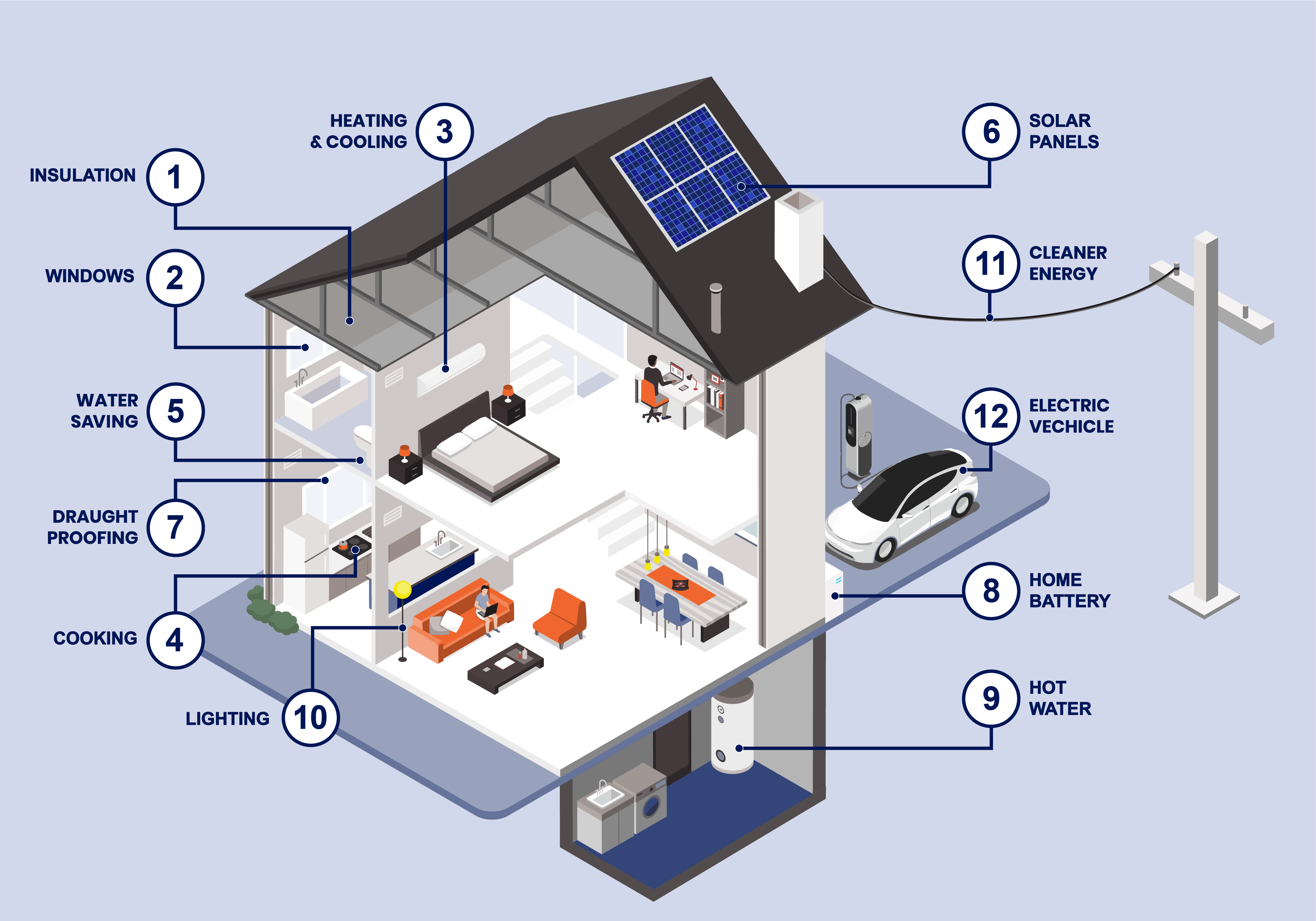Energy efficiency is all about using less energy to maintain a comfortable home. This means using less power for things like heating and cooling, heating water, lighting and appliances.
To do this, it’s important to look across the entire home. From the appliances that use energy directly, to building materials, structure and even behavioural changes you can make to reduce energy waste.
Below are 12 of the key areas of the home to look at when assessing the energy efficiency of your home.
1. Insultation
Insulation slows down the transfer of heat by creating a barrier between the inside and outside of your home. The better your insulation, the less you need to rely on heating and cooling to keep your home at a comfortable temperature.
Read more about insulation for energy efficiency
2. Windows
Efficient windows, often referred to as energy-efficient windows or insulated windows, help maintain stable indoor temperatures and year-round comfort. They do this by minimising heat transfer between the interior and exterior of your home, reducing the need for heating in winter and cooling in summer.
Read more about windows for energy efficiency
3. Heating & cooling
Split systems (including reverse cycle air conditioners) are the most efficient and reliable way to heat and cool your home year-round. They work by transferring heat between indoor and outdoor environments. Plus, they are cheaper to run, which saves you money.
Read more about heating & cooling for energy efficiency
4. Cooking
Switching from gas burners to electric cooktops, particularly induction cooktops, can reduce your energy use in the kitchen. Induction cooktops are safer, easier to clean and can cook faster.
Read more about cooking for energy efficiency
5. Water saving
There are many ways to reduce water use in the home, often without much effort, saving you money while helping to conserve this precious resource. From efficient fixtures throughout the house and garden to mindful habits, these practices are easy to adopt.
Read more about water saving for energy efficiency
6. Solar power
Solar panels, or solar photovoltaic (PV) panels, convert free, clean sunshine into electricity to power your home. This reduces your energy bills while reducing your carbon footprint too. With quality panels lasting at least 25 years, the savings and environmental benefits can really add up over time.
Read more about solar power for energy efficiency
7. Draught proofing
Draught proofing is one of the quickest and cheapest ways to make your home more efficient. By sealing gaps and cracks, you can prevent cold draughts from getting in during winter, then during summer, you can keep hot air out and air-conditioned air in.
Read more about draught proofing for energy efficiency
8. Home batteries
A home battery is a storage device that allows you to save excess electricity generated by your solar panels. This stored energy can then be used later when the sun isn’t shining or there are blackouts. Batteries are a great way to further reduce your energy bills and minimise your greenhouse emissions.
Read more about home batteries for energy efficiency
9. Hot water systems
Electric hot water systems have taken a leap forward with heat pump technology. Instead of using energy to generate new heat, heat pumps extract heat from the surrounding air and transfer it to the water. This dramatically reduces your hot water running costs.
Read more about hot water systems for energy efficiency
10. Lighting
Energy-efficient lighting, driven by LED (Light Emitting Diode) bulbs, has revolutionised the way we illuminate our spaces. These lighting options not only enhance visibility, but they also use less energy and last longer. This means you save money on energy and reduce your environmental impact.
Read more about lighting for energy efficiency
11. Cleaner energy
Cleaner energy comes from renewable resources that never run out, like solar, wind or hydro power. These resources create little to no greenhouse gas emissions and are therefore better for the environment. You can contribute to a cleaner energy future by choosing an electricity plan that offsets carbon emissions.
Read more about cleaner energy for energy efficiency
12. Electric vehicles
Electric vehicles have redefined the way we travel. From all-electric cars to plug-in hybrids, these vehicles can be maintained at a lower cost, and they offer a cleaner and more efficient alternative to conventional petrol and diesel powered cars.
